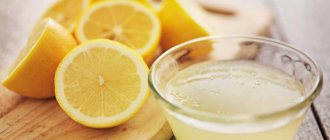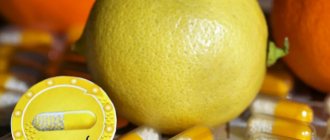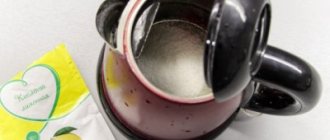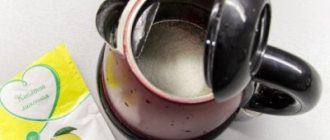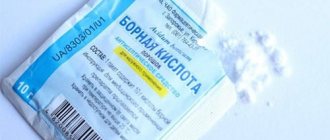Lemon is often used by chefs.
Its juice can be used to clean the internal surfaces of microwave ovens, kettles or washing machines. Due to its high acid content, this juice easily removes various dirt and scale. In addition, lemon juice can make the dough fluffier and improve the taste. If there are no lemon fruits nearby, you can try alternatives. Here are a few common lemon substitutes that will help you get a similar result.
Recipes for delicious lemon tea
Delicious lemon tea can be prepared using the following recipes:
- Cinnamon. Pour 0.5 liters of boiling water 1 tsp. dry tea leaves, dilute in 1-2 tbsp. water a small amount of ground cinnamon. The whole stick can be added directly to the teapot. After cooling, mix both ingredients and add lemon.
- With raspberries and mint. Place dry mint and tea leaves into a press filter and add hot water. If fresh twigs are used, they can be crushed together with raspberries and 1 tsp. honey After preparing the infusion, pour it into a cup with raspberries, stir and let stand for 1-2 minutes.
- With ginger and sea buckthorn. Pour 1 tsp hot water. tea leaves In a bowl, crush 2-3 slices of ginger and lemon with 1-2 tsp. honey Grind 100 g of sea buckthorn in a blender and add to a cup. Pour the warm infusion and let it brew for 5 minutes under the lid.
- With hibiscus and citrus fruits. Pour 1 tsp. dry hibiscus 400-500 ml boiling water. After brewing, add a slice of grapefruit, lemon and orange. Crush the fruit with a spoon and leave for 3-4 minutes.
When using green tea, it is recommended to take varieties and compositions with jasmine.
When is it possible?
Lemon juice can be replaced with acid from a pack if the dish is planned to be heat treated. With strong heating, beneficial substances still evaporate from the juice. The only thing is that the dish will not have a lemon smell. But this will not affect the taste at all.
Add “lemon” instead of lemon juice:
- in marinades for fish and meat;
- in jam;
- in mousses and creams;
- in syrups and sauces;
- in meringues, fondants;
- into baking dough;
- in soft drinks.
We recommend: How to distinguish edible mushrooms from poisonous ones?
But it is not recommended to spray prepared dishes with the solution. This will not have the best effect on the taste.
Some nuances of drinking tea with lemon
It is believed that vitamin C can be destroyed under the influence of boiling water - a controversial issue, but it is still better to put citrus in slightly cooled tea. For those who like hot drinks, it is recommended to drink lemon when drinking tea.
It is most beneficial to drink tea with lemon slices (the zest contains many valuable components), rather than adding juice to the drink. A healthy person can drink tea with lemon every day, but it is better to limit it to 1-2 cups: no health problems will result from such tea drinking.
Composition and calorie content of tea
Lemon drink can be prepared from black, green, white and herbal tea. Flavored compositions can also be used as a base. For example, the Alpine Herbs mixture, which consists of two different types of tea, lemon balm, mint and lemongrass, goes well with citruses. The drink based on hibiscus also has a pleasant sour taste.
The list of beneficial components of lemon tea includes:
- vitamins C, B2 and B9;
- microelements - potassium, manganese, fluorine, copper;
- malic and citric acid;
- pectin;
- phytoncides, essential oils;
- tannins (tannin, polyphenols, etc.).
The calorie content of tea depends mainly on the amount of carbohydrate sweetener: sugar, honey or jam. When adding 2 tsp. granulated sugar per 100 ml cup will contain about 16 kcal. If o, then the calorie content increases to 22-26 kcal per 100 ml.
When adding honey, be aware that it is relatively heavy. In 1 tsp. contains 8-10 g of product. The calorie content of tea with this amount of delicacy is 10-13 kcal per 100 ml. If you add 2 tsp for sweetening. jam, then the energy value of the drink will be 30-33 kcal per 100 ml.
Add 15-20 g of lemon to 1 cup of tea (250 ml). The thickness of such a piece corresponds to 1/6 or 1/8 of the entire fruit. Fresh fruits and berries can increase the energy value of the drink by no more than 4-6 kcal per 100 ml.
To strengthen hair
We simply rinse clean hair with a solution of citric acid, but less concentrated.
Don't despair if you're about to make something and don't have the right ingredient on hand. You can always find a replacement for it, especially if you need to replace lemon juice. Good luck to you!
Citric acid is a white powder, highly soluble in water. Citric acid is used as an additive that regulates the acidity of a food product and gives it a hint of sour taste. In addition, in the food industry, citric acid is used as a preservative, a substance that prevents the growth of microorganisms in the product, the appearance of mold, unpleasant odors and other negative processes. In production, citric acid is labeled as food additive E330-E333.
What does lemon tea go with?
Tea with lemon goes well with other fruits and berries, spices, fresh and dry herbs. Additives enrich the taste of the drink and expand the list of its medicinal properties.
With ginger
Ginger root is useful for colds, loss of strength, chronic stress, gastrointestinal disorders, joint diseases and other pathologies. Fresh roots give the drink a pungent flavor.
With honey
The natural sweetener contains vitamins, amino acids, mineral salts and other nutrients. Lemon-honey infusion is recommended to drink for colds and acute respiratory viral infections.
Buckwheat and linden honey are the best to soothe a sore throat. The treat should be added to lukewarm water.
With mint
Mint leaves are useful for poor appetite, insufficient production of digestive juice, hypertension, bile stagnation, insomnia, migraines, hypertension, heart disease, etc. The essential oil of the plant gives the tea a refreshing and pungent taste.
Cinnamon
Cinnamon relieves hunger, speeds up metabolism and promotes fat burning. Adding whole or crushed spices gives the drink a pleasant sweetish aroma and a slight burning taste.
With raspberries
Raspberries have a beneficial effect on the kidneys, gastrointestinal tract, respiratory organs, central nervous system and other body systems. Due to its diuretic and diaphoretic effects, raspberry infusion relieves inflammation, reduces swelling and lowers body temperature during fever.
The combination of lemon and raspberry increases the effectiveness of the product.
With bergamot
Bergamot is added to tea in the form of zest or essential oil. Oil from the peel of this citrus is an essential component of the Earl Gray composition.
Bergamot oil and zest tone the body, relieve fatigue, improve cognitive function, stabilize blood sugar and cholesterol levels, stimulate digestion and metabolism.
With chamomile
Chamomile infusion and decoction can be used as a base for a drink. They help with gastrointestinal disorders, relieve inflammation and calm the central nervous system during stress and anxiety. The herbal infusion has a characteristic bitterness, so it is better to sweeten the drink with honey.
Benefits and harms
If you put the benefits and harms of lemon tea on an abstract scale, then its beneficial properties will certainly outweigh (provided the drink is brewed correctly).
Benefits of lemon tea
This drink is an excellent aid in the prevention and treatment of infectious diseases (especially often used for ARVI), it strengthens the immune system and restores strength. Lemon tea has the following main properties:
- it activates sweating (important for treating patients with high body temperature);
- promotes free breathing when the nose is stuffy;
- clears the airways of mucus;
- fights pathogenic microorganisms of the throat and oral cavity;
- improves the condition of blood vessels (reduces the likelihood of the formation of atherosclerotic plaques);
- activates brain function, improves performance and rejuvenates the body;
- is a good thirst quencher in the summer heat.
The benefits of black tea with lemon (as well as green tea) are obvious, but in rare cases the drink can be harmful to a person.
Contraindications and possible harm
Those who are allergic to citrus fruits should not drink tea with lemon. Such allergic reactions can lead to extremely undesirable consequences (dermatoses, breathing problems, etc.). It is not recommended to drink the drink for people with high stomach acidity (an illness manifested by heartburn, frequent belching, etc.). If you neglect this advice and often drink tea with lemon, the patient may develop gastritis, ulcers and other serious diseases.
You should also consider the presence of caffeine in any type of tea. Therefore, drinking the drink may be contraindicated for those who cannot tolerate caffeine.
Even a healthy person should not drink lemon tea excessively (more than 6 cups per day). Failure to comply with recommended doses can lead to nervous system disorders and other ailments.
Can pregnant women drink tea with lemon?
In most cases, pregnant women are not contraindicated in drinking tea with lemon, and even, on the contrary, expectant mothers are recommended to drink this drink. After all, it is a good and natural cold remedy, which also strengthens the immune system.
It is highly undesirable for pregnant women to take pills and other medications during illness, so lemon tea with its healing properties becomes even more valuable for expectant mothers. Taking the drink can relieve cold symptoms and improve the general condition of the pregnant woman.
Among other things, tea with lemon reduces swelling in pregnant women. It is important not to exceed the permissible doses of citrus in tea: it is believed that a pregnant woman can consume no more than 1 lemon per week.
- Black tea with lemon: benefits and harm - recipes for black tea with lemon
During pregnancy, a woman should give preference to weak black tea with lemon. According to many experts, green tea impairs the absorption of the most important vitamin B9 (folic acid).
Interesting facts about tea with lemon and scientific research on the possible harm of this drink are covered in this video:
Adviсe
All the tips are simple. However, their implementation is mandatory:
- unplug electric stoves and turn off the tap on gas stoves before starting procedures;
- when using products with aggressive odors, wear a mask;
- protect your hands with gloves;
- avoid getting any products into your eyes;
- do not forget to ventilate the oven after finishing work;
- exclude piercing, cutting and hard objects from available means;
- strictly follow the directions for dosage and duration of exposure.
Try to follow the recommendations. This will eliminate the possibility of poor-quality cleaning and will not harm your health.
Alternative special means
Let's look at popular products.
Dr. Beckmann
- a German cleaner that can be used for all internal elements of washing machines: drum, heating element, pipes. The cleaner eliminates unpleasant odors, scale, and limescale.
To clean the tank, pour 250 g of powder into the machine drum and turn on the wash at +60℃. There is no need to add other detergents or use a prewash program. The laundry should be removed from the tank. Repeat the procedure every 2–3 months
Topper
— express cleaner from Italy for automatic machines. Removes scale, plaque, dirt, and odor. Safe for metal plastic and rubber machine parts. Before using it, you need to empty the tank of laundry, pour the product into the drum, set the temperature to 60℃ without pre-washing. The manufacturer recommends using the product no more than three times a year.
MAGIC POWER
produced in Germany and shows excellent results in removing scale. The product removes limescale from the surface of the drum and tank. Sold in liquid form of 250 ml. The product must be poured into the washing powder compartment and the wash cycle started.
Use in cooking
Lemon juice appears in recipes for a variety of baked goods, confectionery glazes, soups, marinades for meat and fish, and homemade mayonnaise.
Its sour nature (due to its citric acid content) not only gives dishes a fresh taste, but also:
- neutralizes fats contained in other ingredients;
- softens meat when using juice as a marinade;
- neutralizes parasites and pathogens in raw fish;
- in baking recipes it interacts with baking soda, working as a leavening agent;
- promotes browning of some baked goods;
- provides structure in jellies and jams;
- acts as a preservative in winter preparations, sauces and salad dressings;
- adds excellent taste and citrus aroma to confectionery glaze, neutralizing excessive sweetness in baked goods.
Advantages and disadvantages of replacing juice with acid
Lemon contains many beneficial substances and aromatic essential oils. Its main advantage is its benefits to the body. It has tonic properties, improves immunity, improves memory and prevents inflammatory processes.
Lemon and citric acid have only one similarity - a sour taste. "Limonka" is a chemical product. It is obtained through the biosynthesis of sugary substances. Although previously it was actually obtained from citrus fruits.
Pros of using citric acid in dishes:
- low cost;
- compactness;
- long shelf life;
- versatility;
- good solubility in any liquid;
- Allowed for people with allergies to citrus fruits.
“Limonka” loses to juicy citrus only in several respects:
- has a sour, but completely unnatural, unpleasant taste;
- has no smell;
- does not contain vitamins and nutrients.
A pack of citric acid (25 grams) can replace 4-5 lemons, which is equivalent to 150 ml, or 10 tbsp. l, juice.
Harm and contraindications
Citrus tea is harmful for the following indications:
- osteoporosis (bone fragility);
- increased sensitivity of teeth, defects and erosion of enamel;
- gastritis with high acidity, duodenal and stomach ulcers;
- acute inflammation of the throat;
- allergy.
You should use the drink with caution during breastfeeding and pregnancy. Even a small amount of lemon can cause an allergic reaction in a baby. Green tea reduces the absorption of B vitamins, which are necessary for the formation of fetal blood vessels.
Lemon increases the absorption of toxic additives that are present in the tea leaves: for example, aluminum. If the safe norm is observed, the amount of harmful impurities is small, but with frequent use, chronic intoxication can develop.
Benefits of lemon tea
Tea with lemon is used for colds, loss of strength, vascular pathologies, metabolic disorders, urinary tract diseases, poisoning and hangover.
During pregnancy
Lemon tea has the following beneficial effects for pregnant women:
- relieves nausea during toxicosis;
- helps strengthen the immune system;
- prevents constipation;
- reduces the risk of nephritis, cystitis and urethritis.
A cool drink helps cope with malaise, dizziness and heartburn. If a burning sensation in the larynx is caused by gastritis with high acidity, drinking tea is not recommended.
For colds
Lemon infusion stimulates the immune system, relieves cough and sore throat. Warming the nasopharynx helps to constrict blood vessels and reduce nasal congestion.
The refreshing taste of the drink relieves general malaise and nausea, which prevents the patient from eating and gaining strength. For prevention, it is recommended to drink tea during illness and after hypothermia.
In case of acute viral pharyngitis and sore throat, you should refuse the drink. Hot acidified liquid irritates and dries out the mucous membrane.
When losing weight
Unsweetened tea has minimal calorie content, but is a good distraction for those losing weight in between main meals. To cope with sweet cravings during tea parties, you can use combination recipes. They use many unsweetened additives: candied ginger, raspberries, sea buckthorn, fresh mint, cardamom, etc.
To enhance the effect of your workout, drink hot tea with fresh ginger and citrus 15-20 minutes before it. It increases heart rate, stimulates blood circulation and fat burning. For heart and gastrointestinal diseases, this method can be dangerous.
The diuretic properties of the drink are useful for swelling after a hard workout or a festive table.
For hangover syndrome
For a hangover, lemon infusion has the following effects:
- accelerates the oxidation and removal of alcohol breakdown products;
- relieves nausea and thirst;
- increases blood sugar levels, saturates the brain with glucose;
- normalizes metabolism, production of proteins and hormones;
- restores the body's water balance;
- increases overall tone.
Tea for withdrawal symptoms should be sweet.
With high blood pressure
Citrus infusions can be useful for both high and low blood pressure. Hypertensive patients are advised to drink green tea with plenty of lemon, and hypotensive patients - sweet black tea.
The drink helps thin the blood, normalizes blood pressure and calms the nervous system.
For problems with the urinary system
Lemon drink acts as a diuretic. When there is stagnation of fluid in the body, frequent urination helps eliminate swelling, and in case of cystitis, urethritis and nephritis, it helps to wash away bacteria from the mucous membrane.
If swelling is caused by heart or kidney failure, tea should be used with caution and after consulting a doctor.
Tea with lemon for weight loss
The effectiveness of lemon tea for weight loss is a topic that causes a lot of controversy. However, the undeniable fact is that drinking, for example, green tea with lemon in combination with other methods of combating excess weight will definitely lead to the desired result.
Recipe
In order to lose weight, you can use this simple recipe for making a drink:
- 1 tsp leaf green tea without flavorings and various additives is placed in a cup and poured with slightly cooled boiled water (temperature about 90°C);
- the drink is then left to infuse for 5-10 minutes;
- then add a lemon slice (a circle to taste) to a cup of tea or squeeze out a small amount of juice, after which the drink is infused again for a couple of minutes.
It is forbidden to add sugar or other sweeteners to the resulting tea; you can only add additional ice cubes.
Reviews
Rima: “You definitely won’t be able to lose kilos just by drinking tea with lemon! To lose weight, you need to change your habits: establish proper nutrition, etc. And lemon tea is a good aid that promotes better digestion.”
Julia: “When losing weight, drinking green tea with lemon is very useful. But you don’t need to wait for a miracle: for a good result, you still need to reconsider your diet and do physical exercise.”
Calorie content of black and green tea with lemon
100 ml of brewed black tea has a calorie content of 3-6 calories. The same volume of green tea contains only 1 cal. Adding a slice of lemon will increase the calorie content of the drink by about 3 kcal (30 kcal per 100 g). Thus, it can be argued that lemon tea without sugar and other additives is a low-calorie drink that does not pose a danger to your figure.
- Lemon water on an empty stomach: is it beneficial?
Answers:
| Sherl +2 this is the solution 4g. citric acid to 100 ml. water. On average it is. There are many different varieties of lemon, some sour, some sweet. But the average lemon juice has 4%. Mix and measure yourself 3 tbsp. or as much as needed |
| Stafford +6 this is the solution I usually use this ratio: 1 lemon is approximately equal to 8 g of dry citric acid (heaped teaspoon). Dry citric acid should be diluted with water 1:4, that is, if we take one teaspoon of citric acid, then we need to add four teaspoons of water to it. But, you understand, everything is very relative - both the size of the spoon and the acidity of the lemon. |
| marfutak +2 this is the solution Google is here to help you
One teaspoon contains 5 grams of citric acid. |
| Igor02 +2 this is the solution Sorry, maybe not quite on topic. But you can make natural lemon juice yourself. This will require a little patience. No matter how much you look in retail outlets or supermarkets for 100% natural lemon juice, you will not find it. You can write anything you want. To make natural 100% lemon juice, you will need lemons, depending on how much lemon juice you want to make. The hardest part is peeling the lemon, just like you're peeling an orange. Pass the peeled lemons through a juicer, preferably an auger one. Someone can extract juice from lemons with a specially designed citrus juicer. After extracting the juice from the lemons, place on low heat after boiling, and boil for 5 minutes over the lowest heat, strain through cheesecloth into pasteurized bottles or jars, and screw on the lids tightly. Here is a 100% natural juice that can be stored in the refrigerator for a long time. If you make a liter bottle of lemon juice, it will last for a very long time. |
Vinegar
Ordinary vinegar can replace lemon in mayonnaise.
Almost every kitchen has a bottle of vinegar, so finding the ingredient won't be much of a problem. Experienced cooks recommend using wine and apple cider vinegar. In addition, ordinary table vinegar is suitable. This liquid will help quickly extinguish the soda. Thus, there is a wide variety of options for replacing lemon. Each option has its own taste characteristics. However, the properties are the same. We recommend that before adding a substitute, you carefully consider all the suggested tips to choose the appropriate option.
Ways to replace lemon when making pickles
Lemon is considered an important ingredient in canning vegetables. If you suddenly run out of citrus fruits, don’t rush to the store. You can add ordinary vinegar. Apple, wine or table vinegar will do. You can also use fruit vinegar, which helps maintain a pleasant smell and has a positive effect on health.
In addition, the preparation of some pies involves the use of table vinegar instead of citric acid. You just need to pour a few teaspoons of vinegar into the dough. Rest assured that the baked goods will turn out fluffy and delicious.
Proportions for replacement
It is impossible to calculate exactly how much “lemon” you need to take so that its acidity matches the juice of one lemon. Firstly, citrus fruits come in different sizes, and secondly, they differ in juiciness and thickness of the peel. Thirdly, some varieties are very sour, others are more watery. Therefore, all calculations of proportions will be approximate:
- 100 ml lemon juice = 100 ml water and 16 g citric acid.
- Juice of one lemon = 30–40 ml of water and 5 g of lemon juice (teaspoon).
- 1 tbsp. spoon of lemon juice = 1 tbsp. a spoonful of water and 0.5 teaspoons of lemon.
It is advisable to taste the diluted liquid. If it is not sour enough, add lemon. And if it’s the other way around, add water.
You definitely shouldn’t replace lemon with acid to boost immunity or improve health. It does not benefit the body and in high doses can cause irritation of the mucous membranes, burns, stomach pain, burning, and nausea.
Recipe examples
Examples of some recipes for making tea with lemon.
Classic recipe
The easiest way to cook. Black (or green) tea is brewed in the usual way, with a slice of lemon placed in a cup. After a few minutes of infusion, the drink can be drunk.
Tea with lemon and milk is an unfortunate combination of ingredients. Citric acid ensures the curdling of milk and the formation of flakes. The drink loses its taste and aesthetic appearance.
With lemon and honey
To prepare you will need tea leaves, water, lemon, honey. The recipe is also simple and is probably familiar to everyone since childhood. A lemon slice is dipped into the brewed and already not hot tea. To make the drink as healthy as possible, honey is added at a tea temperature of about 40°C. The beekeeping product is added to taste - 1-2 tsp. per cup.
With lemon and mint
Have to take:
- 4 mint sprigs (tops);
- 2 slices of lemon;
- 2 tsp tea leaves (black tea);
- water (per 1 teapot).
The mint and tea leaves are placed in a pre-heated kettle (it is convenient to use a press filter), poured with a small amount of boiling water and infused for a couple of minutes. Then lemon is added there, the kettle is completely filled with hot water, and everything is infused again for about 5 minutes.
